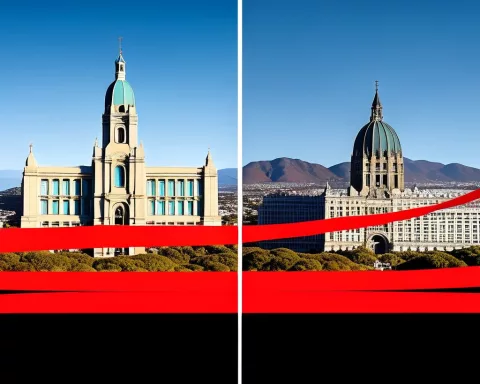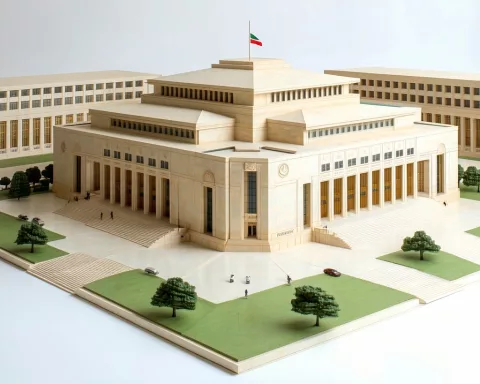In South Africa, a big fuss has erupted over a tender worth R898 million for new driver’s licence card machines, awarded to a French company called Idemia Security. This controversy was sparked when the Auditor-General found irregularities in the tender process, leading Transport Minister Barbara Creecy to pause the rollout. Many, especially the Democratic Alliance party, are calling for complete transparency and major reforms to tackle the mismanagement in the Department of Transport. This situation reflects deeper issues in the government that need to be fixed to regain public trust.
What is the controversy surrounding the driver’s licence card machine tender in South Africa?
The controversy involves a R898 million tender awarded to Idemia Security for driver’s licence card machines, marred by irregularities identified by the Auditor-General. Critics, including the DA, demand full transparency and systemic reforms to address mismanagement and restore public trust in governmental processes.
In the ever-volatile terrain of South African politics, controversies emerge frequently, each stirring public debate and scrutiny. The most recent uproar involves a R898 million tender awarded to French firm Idemia Security in 2024 for the provision of driver’s licence card machines. This issue has ignited widespread dissatisfaction among political factions and underscored deep-seated procedural and systemic flaws within the Department of Transport.
The Revelation of Irregularities
Transport Minister Barbara Creecy recently disclosed that Auditor-General Tsakani Maluleke identified multiple irregularities during the evaluation of the tender. This discovery has led Creecy to seek judicial intervention, effectively halting the deployment of the new driver’s licences. Speaking on Newzroom Afrika, Creecy mentioned that her department had refrained from expending any funds on the new licences, adhering to the Public Finance Management Act (PFMA), which prohibits financial commitments amidst auditing discrepancies.
The Democratic Alliance (DA) has been particularly vocal, demanding full transparency regarding the tender process. Chris Hunsinger, the DA’s spokesperson on Transport, insists that the comprehensive report from the Auditor-General should be made available to the public. He argues that without such transparency, the root causes of procurement non-compliance will remain obfuscated and unaddressed. While Hunsinger views Creecy’s decision to take the tender to court as a positive step, he stresses that merely addressing procedural irregularities is not enough.
Systemic Mismanagement: A Recurring Pattern
The controversy surrounding the tender is not an anomaly. According to the DA and other political analysts, it is indicative of broader systemic issues plaguing the Department of Transport. For years, the licensing system has suffered from inefficiencies and mismanagement, leading to significant delays and public dissatisfaction. The DA’s call for complete transparency and accountability reflects a deep-seated demand for systemic reform within the department.
This situation mirrors global patterns of governmental mismanagement. Across various nations, tender processes for critical infrastructure and services often encounter irregularities due to a lack of transparency, insufficient oversight, and entrenched corruption. By advocating for the release of the Auditor-General’s full report, the DA aims to disrupt this cycle, holding those responsible accountable and ensuring future procurement processes adhere to ethical standards.
The Intricacies of Tender Processes
Ideally, the tender process should be a meticulous and transparent affair, designed to ensure ethical and efficient use of public funds. However, deviations from these procedures, as seen in the driver’s licence card machine tender, can undermine public trust and confidence in governmental institutions. Irregularities in tender processes not only hamper efficiency but also erode the foundational principles of good governance.
The situation underscores the necessity of adhering to principles of transparency and accountability. Historical movements like the Enlightenment emphasized these values in governance, promoting rationality and openness. The DA’s insistence on full transparency and accountability resonates with these Enlightenment ideals, advocating for a government that prioritizes the interests of its citizens above all else.
The Crucial Role of Public Finance Management
Minister Creecy’s reference to the Public Finance Management Act (PFMA) highlights its critical role in regulating financial management within the public sector. The PFMA aims to ensure efficient and responsible management of public funds, encompassing revenue, expenditure, assets, and liabilities. By emphasizing the PFMA, Creecy accentuates the legal and ethical obligations of government officials in managing public resources.
However, invoking the PFMA also brings attention to the mechanisms in place for preventing and addressing irregularities. While the Act provides a robust framework, its effectiveness is contingent upon stringent enforcement and oversight. The DA’s demand for the complete disclosure of the Auditor-General’s report is a step towards strengthening these mechanisms, ensuring that deviations from established norms are promptly identified and rectified.
Reflections on Governance and Accountability
The tender controversy serves as a stark reminder of the importance of governance and accountability in the public sector. It underscores the need for continuous vigilance and oversight to prevent irregularities and ensure public resources are utilized as intended. The DA’s call for transparency extends beyond addressing a specific tender issue; it advocates for systemic reforms to enhance the efficiency and integrity of public procurement processes.
Reflecting on this controversy necessitates considering the broader implications for public trust in governmental institutions. Transparency and accountability are not merely legal tenets but are fundamental to maintaining public confidence in the government’s ability to serve its citizens effectively. By addressing the tender irregularities and ensuring full disclosure of the facts, the Department of Transport can take significant steps towards rebuilding this trust.
The issues surrounding the driver’s licence card machine tender encapsulate the broader challenges facing public procurement processes. They highlight the need for a comprehensive approach to governance—one that combines robust legal frameworks with effective enforcement and oversight. As South Africa navigates these challenges, principles of transparency and accountability will remain essential pillars in striving for effective and ethical governance.
This tender controversy is not just a fleeting issue; it represents a critical juncture for South Africa’s public procurement processes. The revelations of irregularities, systemic mismanagement, and the urgent need for stringent oversight and transparency call for widespread reforms. The DA’s persistent demands for full disclosure and systemic overhaul aim to ensure that public resources are managed ethically and efficiently.
In navigating these complex issues, it is imperative for South African governmental institutions to commit to the principles of good governance, transparency, and accountability. Only through continuous vigilance and adherence to ethical standards can public trust be restored and maintained, ensuring that governmental actions align with the best interests of the citizens they serve.
FAQ on the Driver’s Licence Card Machine Tender Controversy in South Africa
What is the controversy surrounding the driver’s licence card machine tender in South Africa?
The controversy centers on a R898 million tender awarded to Idemia Security, a French company, for new driver’s licence card machines. Irregularities identified by the Auditor-General prompted Transport Minister Barbara Creecy to pause the rollout, leading critics, particularly the Democratic Alliance (DA), to call for full transparency and reforms to address mismanagement in the Department of Transport.
What irregularities were found in the tender process?
The Auditor-General, Tsakani Maluleke, discovered multiple irregularities during the evaluation of the tender. These findings raised serious concerns about transparency and compliance within the procurement process, prompting Minister Creecy to seek judicial intervention and halt further deployment of the new driver’s licences.
Why is the Democratic Alliance calling for transparency?
The Democratic Alliance (DA) is advocating for full transparency regarding the tender process, arguing that the public should have access to the comprehensive report from the Auditor-General. Without this transparency, they believe that the root causes of procurement issues will remain unaddressed, perpetuating mismanagement within the Department of Transport.
How does this controversy reflect broader issues in the South African government?
The tender controversy is indicative of systemic issues within the Department of Transport, including longstanding inefficiencies and mismanagement in the licensing system. The DA and political analysts believe that these problems are part of a broader pattern of governmental mismanagement affecting public trust and confidence in public institutions.
What role does the Public Finance Management Act (PFMA) play in this situation?
The Public Finance Management Act (PFMA) is crucial in regulating financial management within the public sector. Minister Creecy’s reference to the PFMA highlights the legal obligations of government officials in managing public resources responsibly. It underscores the need for rigorous enforcement and oversight to prevent irregularities like those identified in this tender process.
What steps can be taken to restore public trust in the Department of Transport?
Restoring public trust requires a commitment to transparency, accountability, and systemic reforms within the Department of Transport. This includes addressing the irregularities found in the tender process, ensuring adherence to ethical standards in public procurement, and maintaining vigilance against future mismanagement. By doing so, the government can rebuild confidence in its ability to serve the interests of its citizens effectively.












